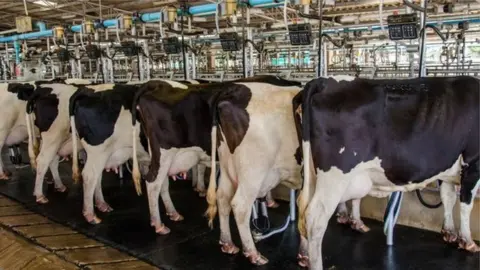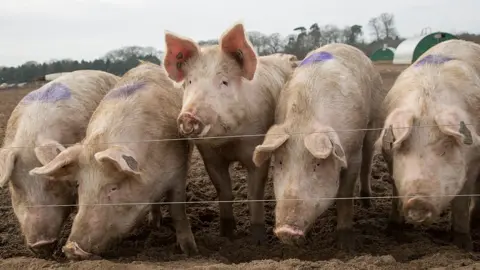Brexit: Cross-border trade could become 'impossible' after no-deal
 Getty Images
Getty ImagesThere is a risk some cross-border trade could become impossible in the days and weeks after a no-deal Brexit, Northern Ireland's chief vet has warned.
Robert Huey said his priority was to try to "keep agri-food moving" and protect farm and business incomes.
Some 100 departmental vets will be assigned, with 300 additional support staff and private sector vets all pulled in to certify shipments.
But Mr Huey warned there would be difficulties in the event of no-deal.
"I can't sit and guarantee people that things won't be difficult," he said. "I can almost guarantee you that they will."
Grind to a halt
Mr Huey said it would be a particular problem for food retail and distribution companies because of complex certification rules.
If there were not agreed systems for accepting UK exports into the EU, things could grind to a halt, he added.
Mr Huey said if something was not agreed quickly, there would be "no legal way" for cross-border trade to continue.
"It leaves trade impossible. It takes two to tango here. There's the exporters' responsibility and there's the importers' responsibility.
"I'm trying to ensure that the exporter can fulfil their responsibilities," he said.
Until Brexit happens UK authorities cannot get into negotiation with EU officials, including in Dublin, about what exporters must do to comply with Single Market rules.
That could mean lorry-loads of food products turning up at delivery depots in the Republic of Ireland unsure about whether they would be accepted.
The Department of Agriculture Environment and Rural Affairs has been setting out how it plans to cope with a huge increase in certification required in the event of a no-deal Brexit.
If current patterns of trade were to continue, up to 1.9m Export Health Certificates would be needed a year - a huge increase on the 18,000 currently issued annually.
Mr Huey said it would be impossible to deal with such a volume of paperwork.
An EHC is an official document signed by a vet or qualified person to verify a food or animal export meets the health and safety requirements of the importing country.
Normally the rules for such certificates would be the result of a long period of negotiation between vets in the importing and exporting countries.

In the absence of negotiation Northern Ireland officials have been interpreting the rules of the EU's certification process and doing their best to provide guidance to exporters.
DAERA will use its departmental vets to sign export paperwork for big companies processing meat and milk.
That would mean 400,000 certificates a year.
The food retail and distribution businesses will be asked to turn to private vets to sign off their shipments - something they have not needed before.
That will mean a potential cost for those businesses of up to £40 a certificate.
Mr Huey said they were looking at ways to cut the need for an estimated 1.5m certificates a year in that sector, but it was still unclear whether the EU would accept them.
He said it was possible that the number could be dramatically reduced because many firms would struggle to comply with the certification requirements.
 Getty Images
Getty ImagesPatterns of trade would change and companies might have to redirect their produce to new markets.
Mr Huey said there were some products for which there were no certificates, effectively halting that trade.
"There are some certificates that are so complex that companies will not be able to fulfil the requirements to allow the vets to sign the certificates."
He urged companies to engage with the department to ensure they were ready in the event of a no-deal Brexit.
